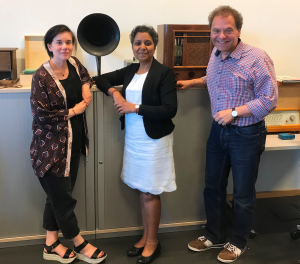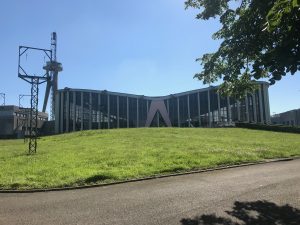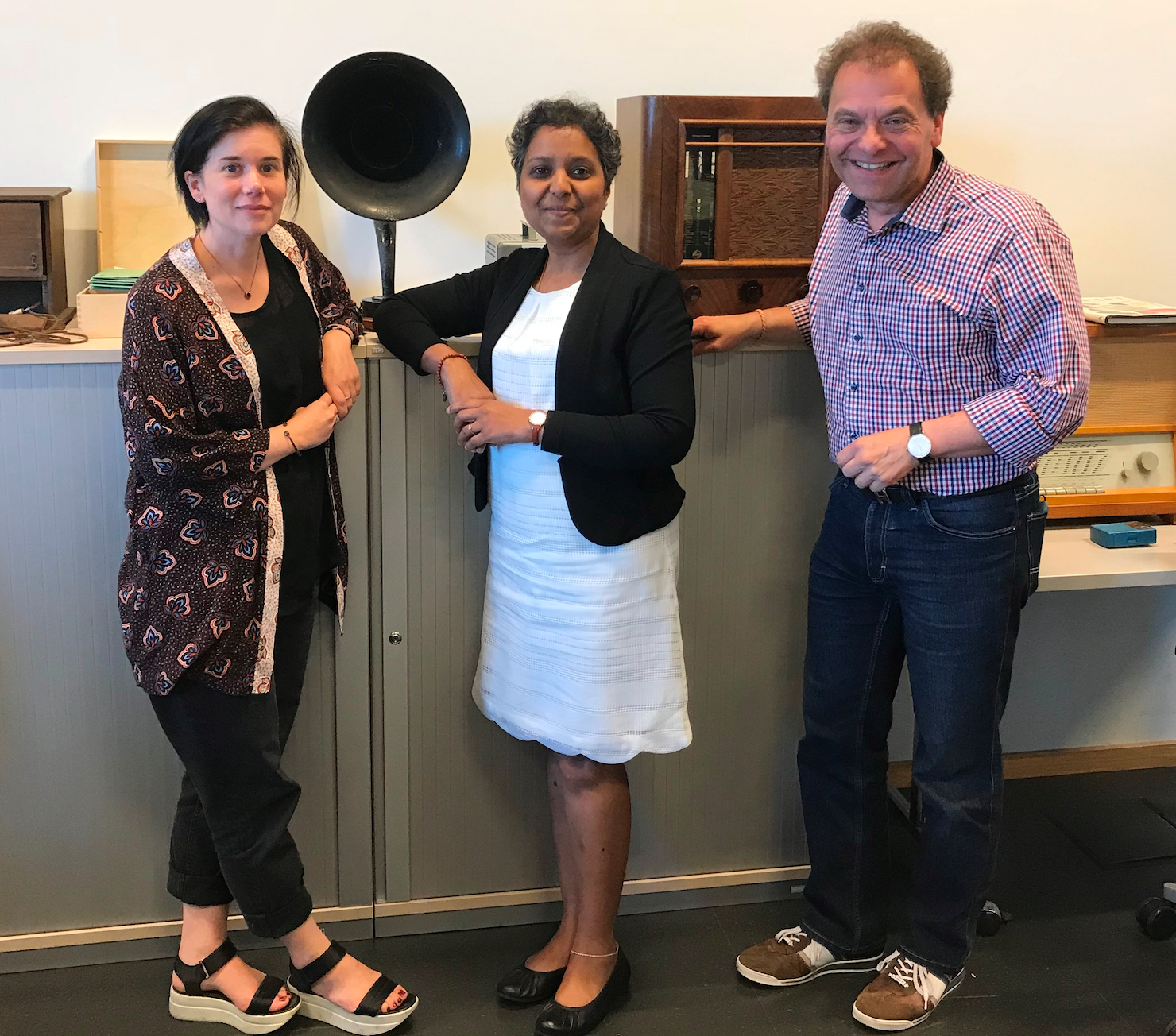
A report from the “Transnational Radio History” Summer School at C2DH, Luxembourg University, 18–22 June 2018
A seminar room stuffed with fascinating old and still working radio sets and recording devices, two excursions to historic sites and buildings where transnational radio history took place, the production of podcasts, all this along with a series of papers by researchers from Chile to Russia, from Morocco to India. This made the Summer School “Transnational Radio History” a truly amazing and inspiring event. The Summer School took place at the “Centre for Contemporary and Digital History” (C2DH) at Luxembourg University from 18 to 22 June 2018. Professor Andreas Fickers along with PhD candidate Richard Legay hosted the event and three additional experts were also invited; one of them Professor Alexander Badenoch from Utrecht University, the other two Dr Kristin Skoog from Bournemouth University and Dr Hans-Ulrich Wagner from the Hans-Bredow-Institute at Universität Hamburg, both steering committee members of EMHIS.
Transnational histories of the 20thcentury
“Hands on history!” – Andreas Fickers, director of the C2DH, claimed and therefore one can say that “hands on transnational radio history” might be the headline of what international researchers in this field did during their stay in the Grand-Duchy of Luxembourg. The main objective of the Summer School was to explore the history of transnational radio in the twentieth century, with specific focus on the technical, material and architectural histories of radio, and also how to grasp cross-border histories when dealing with infrastructure and institutions, with aesthetics and communities of listeners. The objective was also to explore methodologies, archives and source material for doing transnational radio history, and the challenges that one, no doubt, will encounter.
PhD candidates and Postdocs were invited to discuss their research in the field of transnational radio history. Among them was Dr Gloria Khamkar, a member of EMHIS Network at Bournemouth University. Gloria presented a paper on her doctoral research “The Evolution of British Asian Radio in England (1960-2004)” in a panel titled ‘Between the Local and the Global.’ Gloria discussed her source material and played an audio clip from one of the Asian radio programmes produced by the BBC Local Radio in Leicester in the 1970s. Gloria also shared an audio clip from her own weekly radio show Suhaana Safar, broadcast on Southampton’s (UK) Asian and ethnic radio station Unity101, which was a captivating listening experience.
My favourite document
In planning the Summer School, Andreas, Richard, Kristin, Alec, and Hans-Ulrich were keen that the focus of the presentations and discussions would lie on the historical source material. The idea from the start was to encourage all participants to talk about a single document and this approach turned out to be quite fruitful. Kristin for example explored the intermedial and transnational entanglements of Radio Pictorial, a radio fan magazine published in the UK in the 1930s. Hans-Ulrich played a disk of 1931 staging urban maritime sounds of Hamburg as a port city, and put forward for discussion a four-step-model for analysing sound documents of the past.
On site
Additional highlights were the several excursions during this Summer School week. One afternoon the group visited the new studios and headquarter of the RTL Group as well as the transmitter site in Junglinster, from which Radio Luxembourg was transmitted. We also visited the Centre National de l’Audiovisuel in Dudelange where we learned more about Luxembourg’s audiovisual heritage and archival practices. The most striking trip took us to Berus, a village in the Saarland in Germany, to the transmitter site of Europe 1. This site was not only an architectural gem with its curved roof and glass panels (almost cathedral like) but also one with a rich and fascinating history. Master of Engineering Axel Böcker at the State Office for the Preservation of Historical Monuments gave an inspiring talk and tour of the building, and after lunch – served outside in the sunshine – the day continued with presentations by the Summer School participants as well as a Q&A with former engineers who had worked at the site. The day ended with a fantastic art performance by the Liquid Penguine ensemble.

Overall a great variety of topics were discussed at the Summer School. There were presentations by Dr Francisco Garrido (National Natural History Museum of Santiago) on “Modernizing a Nation: RCA VICTOR in Chile, 1928-1973”, by Dr Jose Emilio Perez (Université Paris-Sorbonne) on “The Origins of the Free Radio Movement in Madrid (1976-1989)”, byEddie Bohan (Independent broadcaster) on “Transnational Broadcasting from Ireland”, by Dr Joanna Walewska (University of Torun) and Dr Slawomir Wieczorek (University of Wroclaw) on “Radio Broadcasting in Silesia” after WWII and the “Soundscape of Breslau/Wroclaw in 1945”, by Maryam El Moumni (Universität Cottbus) on “The Cultural Significance of Telecommunication Heritage Sites” and many more.
It was truly an enriching experience, with so much to take forward and so many ideas to digest. The concept of ‘entanglement’ proved to be a fruitful concept to work with when approaching transnational radio history. For example, to consider the entanglements of materiality, politics, people and networks, intermediality, and of course the transnational. To further consider radio as part of a media ensemble/repertoire. A call for more integrated histories was made as well as a call to collaborate – to do transnational radio history it is necessary to bring people with different languages, backgrounds, traditions and cultures together. A clear message emerged from Summer School: Transnational radio history is alive!
Gloria, Kristin, Hans-Ulrich

